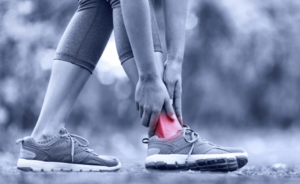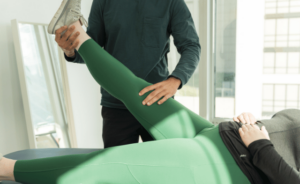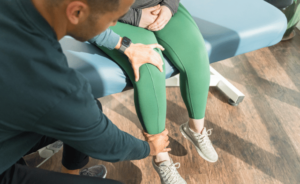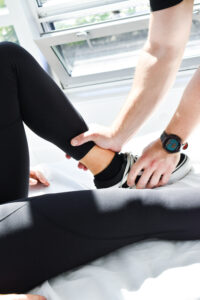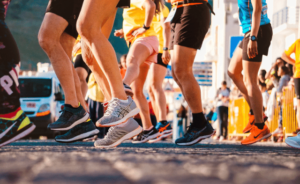If you’re experiencing discomfort, don’t worry—there are effective solutions tailored specifically for running physiotherapy in Vancouver. Whether you’re dealing with runner’s knee, shin splints, or Achilles tendinitis, physiotherapy for running injuries focuses on addressing the root causes and restoring optimal movement. In this guide, we’ll explore five proven ways to treat running injuries, helping you recover faster and get back to doing what you love—running through Vancouver’s beautiful landscapes.
What Is Achilles Tendinitis and Why Does It Happen?
Running injuries, like Achilles Tendinitis, often develop due to overuse, improper biomechanics, or insufficient recovery time. Vancouver’s active lifestyle makes runners particularly susceptible to conditions like runner’s knee, IT band syndrome, and Achilles tendinitis.
Signs of Achilles Tendinitis
- Pain and stiffness in the back of the heel
- Tenderness after physical activity
- Difficulty pushing off during a run
- Swelling in the tendon area
If you recognize these symptoms, it’s important to address them early to prevent chronic pain or tendon rupture.
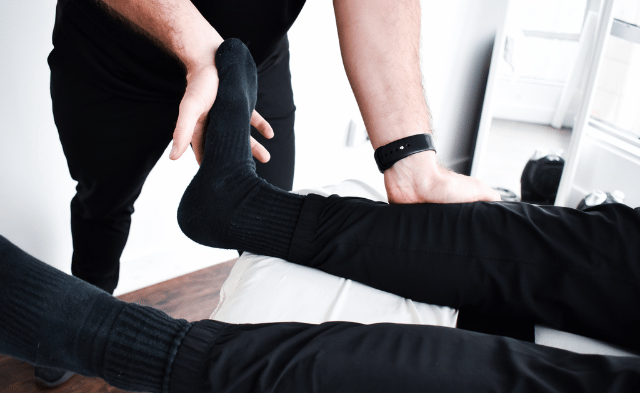
1. Rest and Modify Your Running Routine
One of the first steps in treating Achilles tendinitis is to reduce stress on the tendon. Overuse worsens inflammation, so giving your body time to heal is crucial.
- What You Should Do:
- Reduce running frequency and intensity.
- Avoid running on hilly terrain or uneven surfaces.
- Switch to low-impact activities like swimming or cycling.
This rest period doesn’t mean giving up on fitness entirely—cross-training can help you stay active while reducing strain on your Achilles tendon.
2. Physiotherapy: Your Key to Recovery
Physiotherapy is one of the most effective ways to treat running injuries in Vancouver. A trained physiotherapist can help identify the root causes of your injury and provide personalized treatment plans to aid recovery.
What Can a Physiotherapist Do for Achilles Tendinitis?
- Manual Therapy: Reduces tension and promotes circulation.
- Strengthening Exercises: Improves tendon resilience and calf strength.
- Stretching Routines: Increases flexibility in your calves and Achilles tendon.
Learn more about physiotherapy services for running injuries at Vancouver Physiotherapy Hub.
3. Orthotics and Proper Footwear
In many cases, running injuries stem from poor foot mechanics. Orthotics or supportive footwear can help address alignment issues and reduce stress on the Achilles tendon.
Tips for Choosing the Right Support:
- Visit a specialist in Vancouver for custom orthotics.
- Replace running shoes every 500-800 km.
- Select shoes designed for your gait (neutral, overpronation, or underpronation).
Read about the benefits of orthotics for runners at the Canadian Podiatric Medical Association.
4. IMS Therapy for Achilles Tendinitis
Intramuscular Stimulation (IMS) therapy is a highly effective treatment for runners dealing with Achilles tendinitis and other soft tissue injuries. This technique involves inserting thin needles into tight or shortened muscles to relieve pain, release tension, and restore proper function. Unlike traditional dry needling, IMS therapy focuses on addressing nerve-related issues that often contribute to chronic pain.
Benefits of IMS Therapy
- Relieves pain and reduces muscle tightness
- Improves blood flow to promote healing in the Achilles tendon
- Corrects imbalances in muscle function for long-term recovery
Many runners in Vancouver turn to IMS therapy for its proven results and ability to address underlying neuromuscular problems. It’s a safe, minimally invasive treatment that complements other physiotherapy approaches.
Discover how IMS therapy can accelerate recovery at Vancouver Physiotherapy Hub.
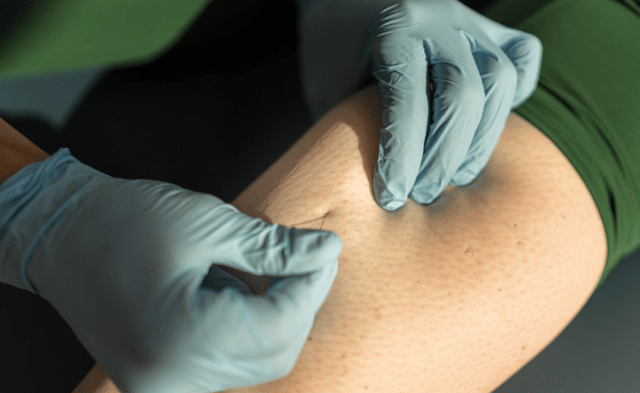
5. Strength and Flexibility Training
Long-term recovery from Achilles tendinitis requires strengthening and stretching the affected area. These exercises improve your tendon’s ability to withstand the demands of running.
Recommended Exercises for Achilles Tendinitis
- Eccentric Heel Drops: Slowly lower your heel below a step to build tendon strength.
- Calf Raises: Strengthen your calves and Achilles tendon.
- Dynamic Stretches: Loosen up your calves and prevent stiffness.
Consistency is key—perform these exercises daily or as advised by your physiotherapist.
Discover evidence-based exercises for Achilles tendinitis from PubMed.
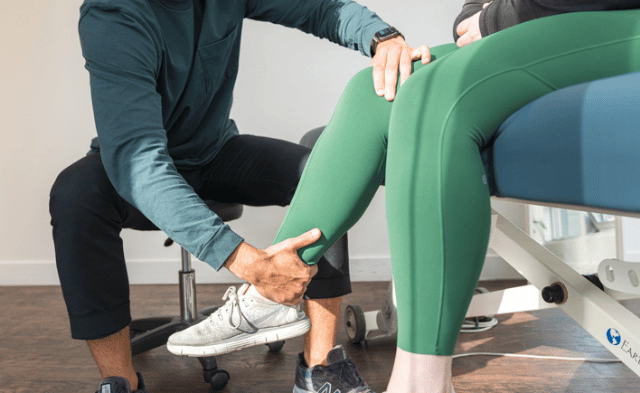
Preventing Running Injuries in Vancouver
While treatment is essential, prevention is the best approach to staying injury-free. Follow these tips to avoid common running injuries:
- Warm Up and Cool Down: Prepare your muscles before running and stretch afterward.
- Gradual Progression: Increase your mileage by no more than 10% per week.
- Listen to Your Body: Address pain or discomfort early to prevent injuries.
Preventing running injuries is crucial for maintaining a consistent and enjoyable running routine. Implementing effective strategies can significantly reduce the risk of common injuries such as Achilles tendinitis. For a more comprehensive guidance on injury prevention, consider exploring the Cleveland Clinic’s expert tips. Their insights cover essential aspects like proper footwear, flexibility exercises, and strength training, all tailored to help runners stay injury-free.
By integrating these practices into your routine, you can enhance your running experience and minimize the likelihood of injuries.
Final Thoughts
Achilles tendinitis and other running injuries can be a setback, but with the right approach, recovery is within reach. By resting, seeking physiotherapy, using orthotics, and incorporating targeted exercises, you’ll be back to running Vancouver’s trails in no time. For expert care, visit Vancouver Physiotherapy Hub and take the first step toward recovery today.
Why Vancouver Physiotherapy Hub Is Your Best Choice
At Vancouver Physiotherapy Hub, we specialize in helping runners recover from injuries and improve their performance. Whether you’re dealing with Achilles tendinitis, runner’s knee, or another running-related issue, our team offers personalized care tailored to your needs.
Services We Offer:
- Manual therapy
- IMS
- Gait analysis
- Customized exercise programs
- Return-to-running programs
Book a consultation today to start your recovery journey!

